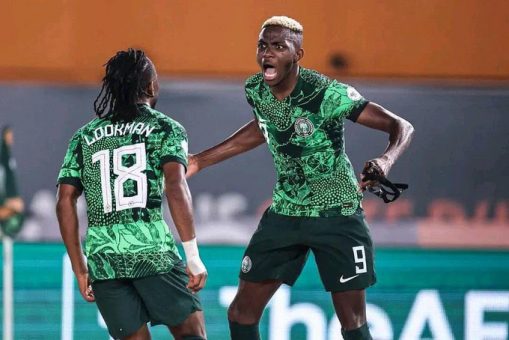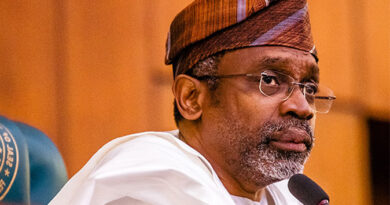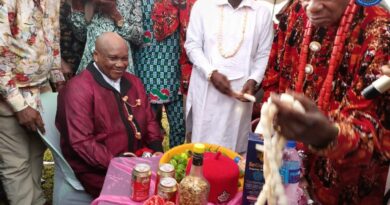Soar Super Eagles Soar! – Timileyin Ola-Adeniyi
(Sports Enthusiast and Super Eagles Fan)
There was a time when Nigeria’s national team struck fear across Africa, we were fierce, disciplined and unyielding. In the 1940s and 1950s, before independence our fore-bearers played for pride, not pay. After gaining independence in 1960, we rebranded as the Green Eagles, symbol of unity and hope. By the late 1980s, after the AFCON triumphs and Olympic glory we became the Super Eagles proud, soaring with confidence and unstoppable.
Ironically, today we are “super” just in name but grounded in dysfunction. Once the Continent’s powerhouse, Super Eagles of Nigeria now drifts through qualifiers, dropping points to Lesotho and Rwanda, these are nations we used to teach how to play. After missing the 2022 World Cup we are again chasing playoff miracles for 2026. How does a country of over 200 million people exporting world-class players to Europe and the world still lack identity on the pitch?
The answer is simple: the same disorder that defines our politics runs through our football. The Nigerian Football Federation has become a smaller version of the Nigerian state full of committees, chaos, and contradictions. Coaches are hired for convenience, not conviction while administrators act by impulse, not insight, each new Board or Committee promises reform only to recycle failure under a new slogan. While other African countries like Morocco and Senegal have built blueprints in football, Nigeria built excuses.
Nigerian Football, like government has become a theatre of improvisation. We react to crises instead of planning ahead, we celebrate short-term victories and ignore long-term direction. Once upon a time, the Super Eagles had structure and identity, the 1994 side was not just talented it was balanced. Our legends from Sunday Oliseh who anchored the midfield like a general, dictating tempo and shielding the backline to Austin “Jay-Jay” Okocha who brought flair and unpredictability while pinging diagonals to the wide.
These men understood spacing and timing, how can I get over watching matches from years before I was born where the great Segun Odegbami stretched play with intelligence on the wings. Watching matches before the millenium (2000) felt like watching a choreography of some sort, these men understood spacing and timing free of chaos. That philosophy is gone.
Today, we mistake improvisation for fluidity by playing Wilfred Ndidi a destroyer, next to Moses Simon, a natural winger. Alex Iwobi, once a creative forward is redeployed as a deep pivot. These are not tactical innovations, they are tactical confusions. Former Coach Eguavoen once spoke about building from the back about composure, patience, and possession. Yet when the team steps onto the pitch, defenders panic under pressure, midfielders hide from the ball, and forwards are stranded. We want to play like Spain, we prepare like Sudan.
Nigeria has cycled through coaches the way we cycle through governments — each arriving with empty promises, each leaving with excuses. Stephen Keshi of blessed memory gave us belief, discipline and local pride but fell victim to federation politics. Sunday Oliseh, one of our brightest minds tried to modernize the team but was undermined by bureaucracy. Gernot Rohr steadied the ship but never upgraded it. Eguavoen played it safe, offering neither courage nor creativity. Jose Peseiro preaches control but delivers confusion, his Eagles presses one half, retreats the next and neither dominates. Each coach inherits a pool of talent but no structure to sustain it.
Our greatest tragedy is not the lack of talent, it is the lack of philosophy. Nigeria once had a way of playing strong in transition, fearless in one-on-one duels, and intelligent in movement. We were known for balance, a mix of African tenacity blended with European discipline. Now we mimic others one month we play counter-attack, the next we chase possession. We can not decide whether we are a pressing side, a possession side, or a reactionary side.
To fly again, we must rebuild rather than restart. We need a philosophy that reflects who we are, which starts in the midfield, the heart of every great footballing identity. Our obsession with Wilfred Ndidi typifies the larger problem, we select by reputation, not by role. Ndidi remains a fine ball-winner but the modern game demands more tempo control, progression, and intelligence under pressure. A modern Raphael Onyedika, Fisayo Dele-Bashiru pivot could offer exactly that. Onyedika brings calmness, balance, and press-resistance, a true anchor who can recycle possession without panic. Dele-Bashiru adds verticality, drive, and dynamism, a midfielder who carries the ball between lines, links play, and shoots from distance.
Tactics are only as strong as the institution behind them, The Nigeria Football Federation remains plagued by mismanagement and nepotism. Coaches are fired without pay, players complain of unpaid bonuses and youth development is treated as charity work not national policy. Our domestic league bleeds talent, stadiums decay. While other nations digitize talent pipelines, we rely on big names and influence.
Nigeria’s football rebirth begins with honesty. We must admit that the Super Eagles have lost their soul and rebuild it, brick by brick, we must invest in coaching education, data analytics and tactical schools for local managers. Above all, the Nigeria Football Federation must stop running as a political fiefdom, leadership should come from football minds not power brokers.
The Super Eagles must rediscover why they were called the Red Devils, burning with hunger and purpose. We can reclaim our essence as the Super Eagles -. majestic not just in name but stature name, laser focused on winning and rise again by replacing sentiments with structure.




